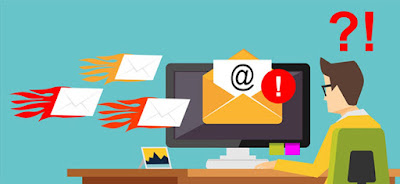WHAT IS EMAIL BOMBARDMENT?


The Internet
is increasingly fraught with dangers and you have to be very careful when
handling personal information. One of the current risks is the theft of digital
identity, which must be learned to prevent in the most efficient way possible
since it affects a large number of users and organizations in the world.
The purpose of
these actions is usually to commit criminal acts. This type of crime is on the
rise online. Masquerading as someone else, whether in public or in private, has
its advantages for the thief and, unfortunately, the victim finds out when it
is too late.
The motives
that move these cyber-criminals are usually economic (theft of bank accounts
and credit card) or social (ruining reputation, defamation, revenge ...
and they do not entail economic ends).
How do they do that?
Let’s point
out some of the ways that thieves steal this information. The most relevant are
the following:
Personal documents:
The loss of the wallet can be a reason for them to access your data
through the Internet (creating a relationship between the offline and online
world), as well as through smartphones, tablets, computers, etc. They are
usually devices that have the passwords linked to the accounts (such as the
e-mail or even in the trash you can find files of great importance).
Insecure online data:
The use of insecure connections due to the lack of installation of an
antivirus, access to non-secure webs (without being HTTPS), creation of simple
passwords and the same for all. Attacks, phishing and, doxing (in exchange for
not posting personal information, ask you to perform certain actions) are the
most common when our data capture.
Companies
that fail to comply with the user data protection regulations: the release of data, whether due to violation
of the same by the entity itself, accident or attack, causes emails, credit
card numbers and everything to be filtered type of personal identifiers of a large
number of people at one time.
Most of this
stolen information is sold on black markets that, depending on the type, will
be used in one way or another for the benefit of cybercriminals.
In order to
protect yourself as safely as possible, we recommend that you put the following
into practice:
Don't "recycle" passwords:
Try to have different passwords for different accounts. To remember
them, it is more advisable to keep them on paper in a drawer at home than to
have them on platforms such as the cloud.
Use strong passwords:
Combine uppercase and lowercase letters and numbers to make them harder
to crack.
Only enter
personal data on reputable websites.
Browse safely:
Using VPN (virtual private network with which you browse without showing
your IP address), very useful when you are browsing through public WiFi’s.
Try not to fall into fraud such as
"phishing": Try to be attentive to the emails you receive
and discard those that seem suspicious (that contain strange links or ask for
too much data).
Protect your
computer and your devices with antivirus systems.
Keep your
security software always up to date.
In the event
of being the victim of an attack, don't forget to immediately cancel all your
bank cards and inform your bank to keep
your money protected before it can be too late.
Comments
Post a Comment